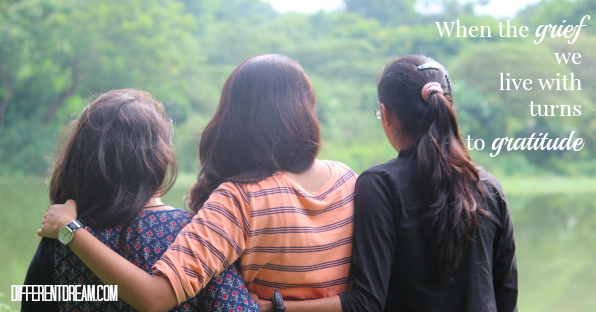The Grief We Live with as Parents of Kids with Special Needs

The grief we live with as parents of kids with special needs is real and pervasive. This week, it showed up in two different places at two unexpected times.
Grief’s first appearance came as I sat enthralled by our granddaughter who was sleeping in my arms. She’s 2 1/2 weeks old, I thought to myself while gazing at her peaceful face and perfect, unmarked skin. She’s the same age our son was when he was released from NICU. With that, grief for his surgical scars and the pain he bore during his early weeks washed over me. I grieved for the 17 days he spent in the hospital instead of in our home as a newborn. My grief felt as fresh and real as it had been after he was born in 1982.
Soon though, the all too familiar sense of loss passed. What remained was gratitude for the child in my arms and the blessing of being part of her early days. A few days later I was grateful again when the grief we live with as parents of kids with special needs appeared in a different place and another unexpected time.
This appearance occurred while I completed one of the final parent interviews for the book I am co-authoring with Dr. Gary Chapman. Each interview ends with the same question: Is there anything else you’d like to mention? I presented that question to the mother of an almost 3-year-old, adorable red-headed boy who has cognitive and speech delays. Here’s what she said:
If necessary, go through counseling to talk about hard things. Have a safe space and a safe person who can help you see more clearly. I’ve done some mental health counseling. There is an element of grief that your life and your child aren’t what you expected. Give yourself space to grieve. Being honest about your grief lets you see what kids with disabilities really need instead of dwelling on all the broken things. So give yourself permission to grieve.
This wise, young mother and I sat in her living room. “Even thought its not something we asked for, our son may live with us the rest of our lives. It’s worth every minute,” she said and smiled at her adorable, red-headed son and said, “You’re worth every minute.”
We looked at one another, connected by the grief we live with as parents of kids with special needs, the grief that binds us together and makes us grateful for the blessings and relationships we never take for granted.
I thought of my son and the 36 years of mingled joy and grief we have known with him. Worth every minute, I offer back in silent prayer. I am so grateful for your life, my son.
Do you like what you see at DifferentDream.com? You can receive more great content by subscribing to the monthly Different Dream newsletter and signing up for the daily RSS feed delivered to your email.
By Jolene
Jolene Philo is a published author, speaker, wife, and mother of a son with special needs.
3 Comments
Submit a Comment
Subscribe for Updates from Jolene
Related Posts
The Lessons I Learned while Raising a Child with EA/TEF
Jolene Philo reflects on a lifetime of lessons learned while raising a child with EA/TEF and shares the insights she’s won.
Looking Back at Your Child’s EA/TEF Journey
Looking back at your child’s EA/TEF journey can give parents a new perspective about past events. Guest blogger Maggi Gale shares how her look back clearly showed her how God was with their family during their daughter’s very unusual first weeks of life in 2002. Three...
How Do I Let Go of My Adult EA/TEF Child?
Valeria Conshafter explores the question “How do I let go of my adult EA/TEF child?” for EA/TEF Awareness Month.






Colleen, thank you for you insight. You are absolutely right about the grief, guilt and anger siblings of kids with special needs may experience. The love language book will have a chapter or part of a chapter devoted to siblings. The emotions they feel will be touched upon, but the gist of the book will always be how to use the love languages. That said, I have wanted to write a book about the stress and secondary trauma parents of kids with special needs live with. If and when that one comes about, your comment makes me think that at least a chapter of it should be devoted to siblings. Thanks so much! Jolene
I hope your book in some ways addresses the siblings involved in a family with a child with disabilities. The grief, guilt and anger those children experience needs to be addresses first by the parents and then an expert if needed. It’s relatively recent that this issue has been “out” in the public. Many of us grew ip in a time when it just wasn’t discussed.
Sometimes the grief sneaks up on me now. I’m used to much of it, but sometimes a friend will talk about her excitement over what her child is doing and I realize that we won’t ever have that moment. Our child will not do all the of the typical things my friends’ children will. The sharp pain in my chest will stay for a day or two while I work out how to handle this new grief, but I also realize I have been so blessed.